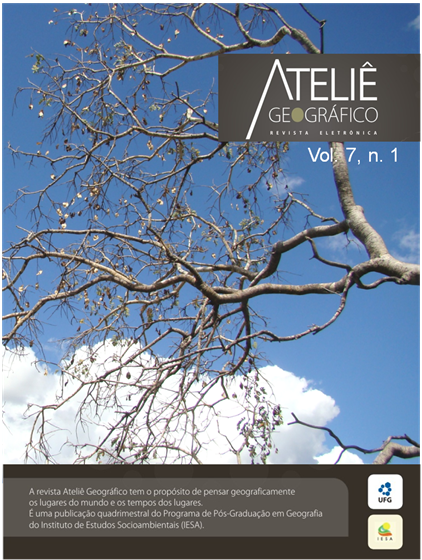CONSOLIDATION OR FRAGMENTATION OF THE TERRITORY: The uses of the “traditional knowledge” concept among the Karajá of Aruanã-GO
DOI:
https://doi.org/10.5216/ag.v7i1.9391Abstract
Resumo
O século XX marcou mudanças significativas no campo jurídico na relação entre Estado Nacional brasileiro e povos indígenas. Durante a Cúpula da Terra de 1992, o Saber Tradicional tornou-se um ativo, tanto econômico, como cultural, então, um conhecimento pode ser utilizado por pesquisadores ou empresários fora do contexto de produção do saber. Em função disso foi criado um sistema normativo de acesso aos conhecimentos tradicionais, que regula as relações entre os indígenas e os atores que são interessados pelos saberes locais. Porém, o que esta em jogo nem sempre é o que esta definido nas leis. Neste artigo abordar-se-á o potencial político do conceito de Saber Tradicional entre os índios Karajá de Aruanã (Goiás), e as implicações do seu uso em termos de relações territoriais. O saber tradicional pode ser invocado tanto para afirmar uma unidade social quanto para apoiar divisões comunitárias. Neste sentido, a proteção e a utilização concreta do patrimônio imaterial dos Karajá parecem ser secundarizadas em relação com os rearranjos políticos e as disputas pelo poder.
Palavras-chaves: Karajá, saberes tradicionais, território, conflitos
Résumé
Le vingtième siècle a été le théâtre de changements significatifs dans le champ juridique des relations entre l’Etat brésilien et les peuples autochtones. Lors du Sommet de la Terre de 1992, le “savoir traditionnel” associé à la biodiversité est devenu un actif économique et culturel, susceptible d’être utilisé par des chercheurs ou par des industriels en-dehors du cadre de production du savoir. C’est en fonction de ces nouveaux enjeux qu’un système normatif d’accès aux savoirs traditionnels a été créé au Brésil, afin de réguler les relations entre les indigènes et les acteurs interessés par les savoirs locaux. Toutefois, ce qui est en jeu n’est pas toujours ce qui est défini dans les lois. Cet article appréhende ainsi le potentiel politique du concept de savoir traditionnel chez les Karajá d’Aruanã (Goiás), et analyse les implications de son usage en termes de relations territoriales. Le “savoir traditionnel” peut être invoqué autant pour légitimer une unité sociale que pour appuyer des divisions communautaires. La protection et l’utilisation concrète des savoirs paraissent être secondaires par rapport à leur mise à contribution pour des réarrangements politiques et des batailles de pouvoir.
Mots-clé : Karajá, savoirs traditionnels, territoire, conflits
Abstract
The relations betwwen indigenous peoples and the Brazilian State have undergone significant changes during the twentieth century. “Traditional knowledge” has become since the Earth Summit in 1992 an economic and cultural asset, which may be used by reserchers or firms outside the production context of the knowledge. These new stakes has favored the creation in Brazil of a normative system aimed at regulating the relations between indigenous and actors interested in such knowledge. Nevertheless, what is really at stake is not always what is defined in laws. This article thus deals with the political potential of the traditional knowledge concept among the Karajá of Aruanã (Goiás), and analyses its practical implications in terms of territorial relations. Traditional knowledge may be invoked to legitimize a social unity as well as to underline community divisions. The protection and actual use of traditional knowledge seem to be less important than its enlistment for political rearrangements and fights for power.
Keywords: Karajá, traditional knowledge, territory, conflicts
Downloads
Downloads
Published
How to Cite
Issue
Section
License
Autores que publicam nesta revista concordam com os seguintes termos:- Autores mantém os direitos autorais e concedem à revista o direito de primeira publicação, com o trabalho simultaneamente licenciado sob a Licença Creative Commons Attribution que permite o compartilhamento do trabalho com reconhecimento da autoria e publicação inicial nesta revista.
- Os autores não serão remunerados pela publicação de trabalhos na Revista Ateliê Geográfico. Além disso, os conteúdos publicados são de inteira e exclusiva responsabilidade de seus autores, ainda que reservado aos editores o direito de proceder a ajustes textuais e de adequação às normas da publicação.
- Autores têm permissão e são estimulados a divulgar seu trabalho online (ex.: em repositórios institucionais ou na sua página pessoal), já que isso pode gerar alterações produtivas, bem como aumentar o impacto e a citação do trabalho publicado (Veja O Efeito do Acesso Livre).


